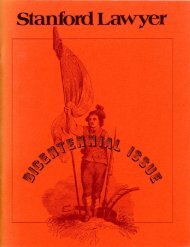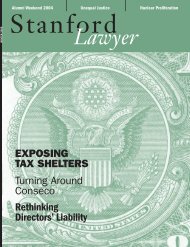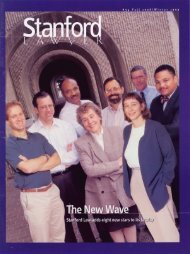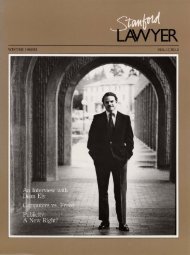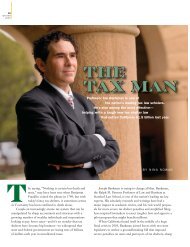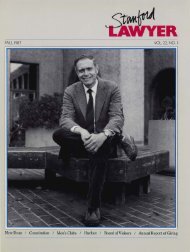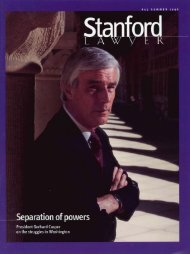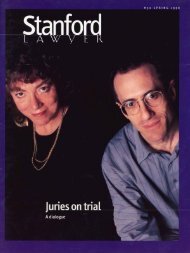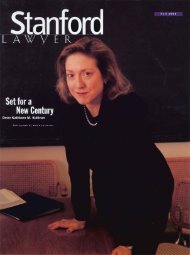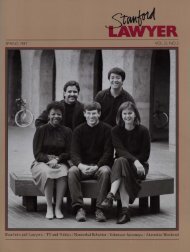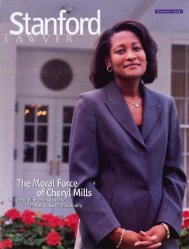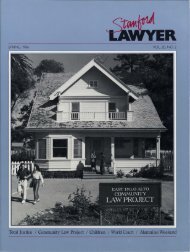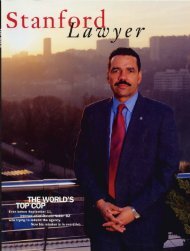Fall 1996 – Issue 50 - Stanford Lawyer - Stanford University
Fall 1996 – Issue 50 - Stanford Lawyer - Stanford University
Fall 1996 – Issue 50 - Stanford Lawyer - Stanford University
You also want an ePaper? Increase the reach of your titles
YUMPU automatically turns print PDFs into web optimized ePapers that Google loves.
Faculty Notes<br />
Continued from page 28<br />
two-day annual meeting ofthe<br />
tobacco policy and evaluation<br />
program that he directs for the<br />
Robert Wood Johnson Foundation.<br />
Rabin also provides<br />
expert commentary on tobacco<br />
liability and litigation issues<br />
in the press and on radio news<br />
shows like KQED's Morning<br />
Edition.<br />
Margaret]ane Radin has been<br />
named to the William Benjamin<br />
Scott and Luna M. Scott<br />
Professorship in Law (see page<br />
22). Her other major news is<br />
the publication of her book<br />
Contested Commodities by<br />
Harvard <strong>University</strong> Press in<br />
May. The book challenges the<br />
dominant economistic style of<br />
public policy thought and explores<br />
why we should not conceive<br />
ofeverything as a commodity.<br />
For more on this subject,<br />
see the interview with<br />
Professor Radin beginning on<br />
page 10.<br />
Deborah L. Rhode is the<br />
School's new Bernard D. Bergreen<br />
Faculty Scholar, an<br />
honor that encourages and<br />
supports research by outstanding<br />
younger members<br />
of the faculty. In addition to<br />
her scholarly writings, Professor<br />
Rhode contributes a bimonthly<br />
column to the National<br />
LawJournal. Topics this<br />
spring included the disparity<br />
between the workplace realities<br />
of male and female lawyers<br />
and problems that arise<br />
when no-fault divorce laws are<br />
blamed for high rates of marital<br />
dissolution.<br />
Kenneth E. Scott, Ralph M.<br />
Parsons Professor of Law and<br />
Business, Emeritus, was at<br />
George Mason <strong>University</strong><br />
School of Law in May to talk<br />
about Columbia professor<br />
Mark Roe's book on corporate<br />
governance, Strong Managers,<br />
Weak Owners, which contends<br />
that the U.S. system of<br />
fragmented stockholdings<br />
and dominant managers is the<br />
product ofpolitical forces and<br />
restrictions, not ofthe economic<br />
imperatives of largescale<br />
enterprises. Professor<br />
Scott offered a critique of the<br />
book's positive thesis and normative<br />
implications.<br />
William Simon, Kenneth and<br />
Harle Montgomery Professor<br />
of Public Interest Law, delivered<br />
lectures at Harvard, William<br />
& Mary, and the <strong>University</strong><br />
of Denver on lawyers'<br />
ethics-the subject also of his<br />
forthcoming book from<br />
Harvard <strong>University</strong> Press, The<br />
Practice ofJustice. He recently<br />
had an article, "Legal Structure<br />
ofthe Chinese 'Socialist<br />
Market' Enterprise," published<br />
in The Journal ofCorporation<br />
Law. Also active in public service,<br />
Simon has joined the<br />
board of the East Palo Alto<br />
Community Law Project.<br />
Kathleen Sullivan has been<br />
named to the new Stanley Morrison<br />
Professorship in Law (see<br />
page 21). Also this spring, Professor<br />
Sullivan was chosen by<br />
the graduating class to receive<br />
the John Bingham Hurlbut<br />
Award for Excellence in Teaching<br />
and to deliver the Commencement<br />
keynote address<br />
(see pages 23-25). In]uly she<br />
helped wrap up the Supreme<br />
Court term on National Public<br />
Radio and the NewsHour with<br />
Jim Lehrer. And in August, her<br />
essay "In Defense of Federal<br />
Power" appeared in the New<br />
York Times Magazine.<br />
Kim Taylor-Thompson has an<br />
article, "Individual Actor vs.<br />
Institutional Player: Alternating<br />
Visions of the Public Defender,"<br />
slated for publication<br />
in the forthcoming Georgetown<br />
Law Review. After teaching<br />
at <strong>Stanford</strong> this fall, Professor<br />
Taylor-Thompson will<br />
move to New York, where<br />
both she and her husband,<br />
Tony Thompson, will assume<br />
tenure-line clinical appointments<br />
at New York <strong>University</strong><br />
Law School.<br />
Barton H. "Buzz" Thompson,<br />
Jr. has been named to the<br />
Robert E. Paradise Professorship<br />
in Natural Resources<br />
Law (see page 22). Professor<br />
Thompson previously held<br />
the Paradise Fellowship for<br />
Excellence in Teaching and<br />
Research.<br />
Robert Weisberg is the<br />
School's inaugural holder of<br />
the Edwin E. Huddleson, Jr.<br />
Professorship in Law (of<br />
which more on page 21).<br />
Professor Weisberg's previous<br />
honors include serving as the<br />
inaugural Bernard E. Bergreen<br />
Faculty Scholar. This spring<br />
he participated in a SUNY<br />
Buffalo Law School symposium<br />
on the recently enacted<br />
New York death penalty law.<br />
And in August, Weisberg and<br />
James Liebman '77, now a<br />
Columbia professor, presented<br />
an analysis of the new<br />
habeas corpus reform law at<br />
the annual summer Ninth<br />
Circuit]udicial Conference.•<br />
From the Dean<br />
Continued from page 3<br />
of tomorrow's society. In an ideal world,<br />
one could achieve this end without<br />
affirmative action, and that should be<br />
our ultimate aspiration. But we just are<br />
not there yet.<br />
SOCIOECONOMIC FACTORS<br />
WILL NOT SUFFICE<br />
It has been suggested that admissions<br />
based solely on socioeconomic<br />
disadvantage might maintain racial<br />
diversity as well. Socioeconomic diversity<br />
is valuable in its own right, and it is<br />
already an important factor in<br />
<strong>Stanford</strong>'s admissions process. But neither<br />
our experience to date, nor a preliminary<br />
study of the demography of<br />
our applicant pool, suggests that socioeconomic<br />
diversity alone can produce a<br />
racially diverse student body.<br />
Much of the explanation for this<br />
lies in the word "minority." For example,<br />
while many African Americans<br />
come from disadvantaged backgrounds,<br />
many whites do as well; and the U.S.<br />
population has six times more whites<br />
than African Americans. Unless<br />
<strong>Stanford</strong> were to make socioeconomic<br />
disadvantage virtually the sole criterion<br />
for admission, to the exclusion of all<br />
other factors, the diversity of our student<br />
body would decline precipitously<br />
if we could not give some consideration<br />
to race along the lines approved by the<br />
Supreme Court in Bakke.<br />
THE IMPORTANCE OF FREE<br />
DISCOURSE<br />
Institutions of higher education<br />
should be hesitant to take positions on<br />
public issues, because our central missions<br />
of teaching and scholarship<br />
depend on freedom of inquiry-and<br />
this freedom can be inhibited by official<br />
institutional views. But universities have<br />
no choice but to determine their own<br />
practices with respect to curriculum,<br />
hiring, and admissions. And as<br />
President Gerhard Casper recently<br />
noted, a diverse student body is essential<br />
to <strong>Stanford</strong> <strong>University</strong>'s mission.<br />
Observing that it is our task "to find<br />
and educate those who can become the<br />
leaders of the future in a multiethnic<br />
and multiracial society," President<br />
Casper explained that "this cannot be<br />
done unless the country's demographic<br />
diversity finds a presence on campus.<br />
We do not admit minorities to do them<br />
a favor," he said. Rather, "we want students<br />
from a variety of backgrounds to<br />
help fulfill our educational responsibilities."<br />
Based on public debates and private<br />
discussions about affirmative<br />
action while you have been at Stan-<br />
Continued on next page<br />
FALL <strong>1996</strong> STANFORD LAWYER 29




